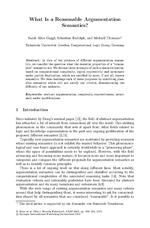What Is a Reasonable Argumentation Semantics?
Aus International Center for Computational Logic
What Is a Reasonable Argumentation Semantics?
Sarah Alice GagglSarah Alice Gaggl, Sebastian RudolphSebastian Rudolph, Michaël ThomazoMichaël Thomazo
Sarah Alice Gaggl, Sebastian Rudolph, Michaël Thomazo
What Is a Reasonable Argumentation Semantics?
In Eiter, Thomas and Strass, Hannes and Truszczyński, Mirosław and Woltran, Stefan, eds., Advances in Knowledge Representation, Logic Programming, and Abstract Argumentation - Essays Dedicated to Gerhard Brewka on the Occasion of His 60th Birthday, volume 9060 of Lecture Notes in Computer Science, chapter Abstract Argumentation, 309-324. Springer International Publishing, 2015
What Is a Reasonable Argumentation Semantics?
In Eiter, Thomas and Strass, Hannes and Truszczyński, Mirosław and Woltran, Stefan, eds., Advances in Knowledge Representation, Logic Programming, and Abstract Argumentation - Essays Dedicated to Gerhard Brewka on the Occasion of His 60th Birthday, volume 9060 of Lecture Notes in Computer Science, chapter Abstract Argumentation, 309-324. Springer International Publishing, 2015
- KurzfassungAbstract
In view of the plethora of different argumentation semantics, we consider the question what the essential properties of a “reasonable” semantics are. We discuss three attempts of such a characterization, based on computational complexity, logical expressivity and invariance under partial duplication, which are satisfied by most, if not all, known semantics. We then challenge each of these proposals by exhibiting plausible semantics which still not satisfy our criteria, demonstrating the difficulty of our endeavor. - Forschungsgruppe:Research Group: Computational LogicComputational Logic, Logische Programmierung und ArgumentationLogic Programming and Argumentation
@incollection{GRT2015,
author = {Sarah Alice Gaggl and Sebastian Rudolph and Micha{\"{e}}l Thomazo},
title = {What Is a Reasonable Argumentation Semantics?},
editor = {Eiter and Thomas and Strass and Hannes and Truszczy{\'{n}}ski and
Miros{\l}aw and Woltran and Stefan},
booktitle = {Advances in Knowledge Representation, Logic Programming, and
Abstract Argumentation - Essays Dedicated to Gerhard Brewka on
the Occasion of His 60th Birthday},
series = {Lecture Notes in Computer Science},
volume = {9060},
publisher = {Springer International Publishing},
year = {2015},
pages = {309-324},
doi = {10.1007/978-3-319-14726-0_21}
}
